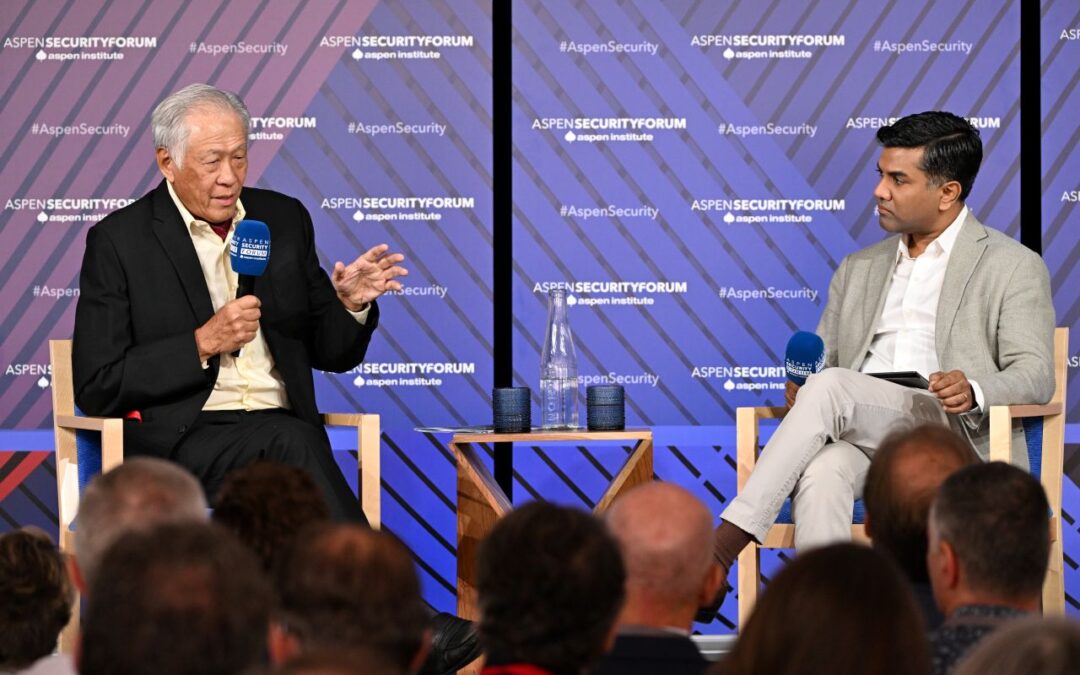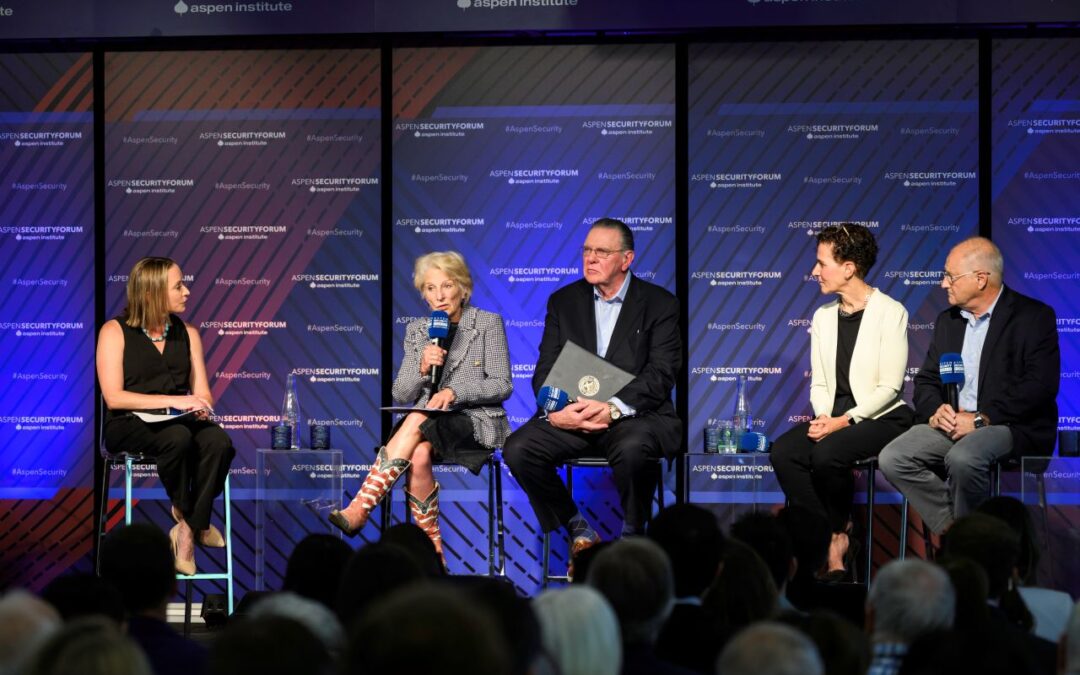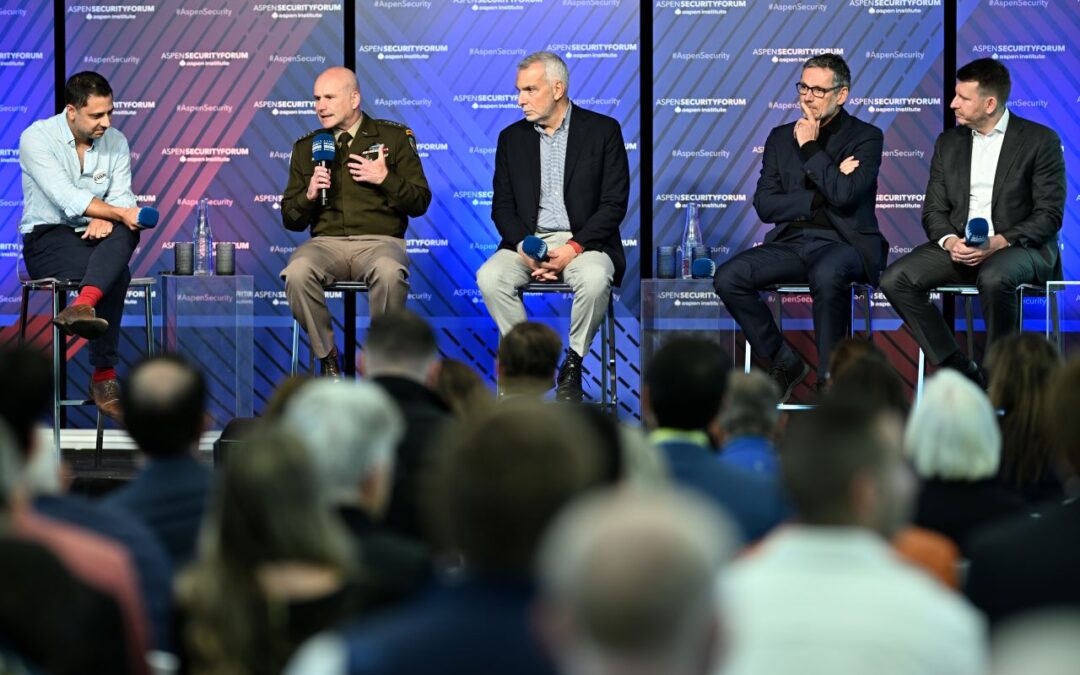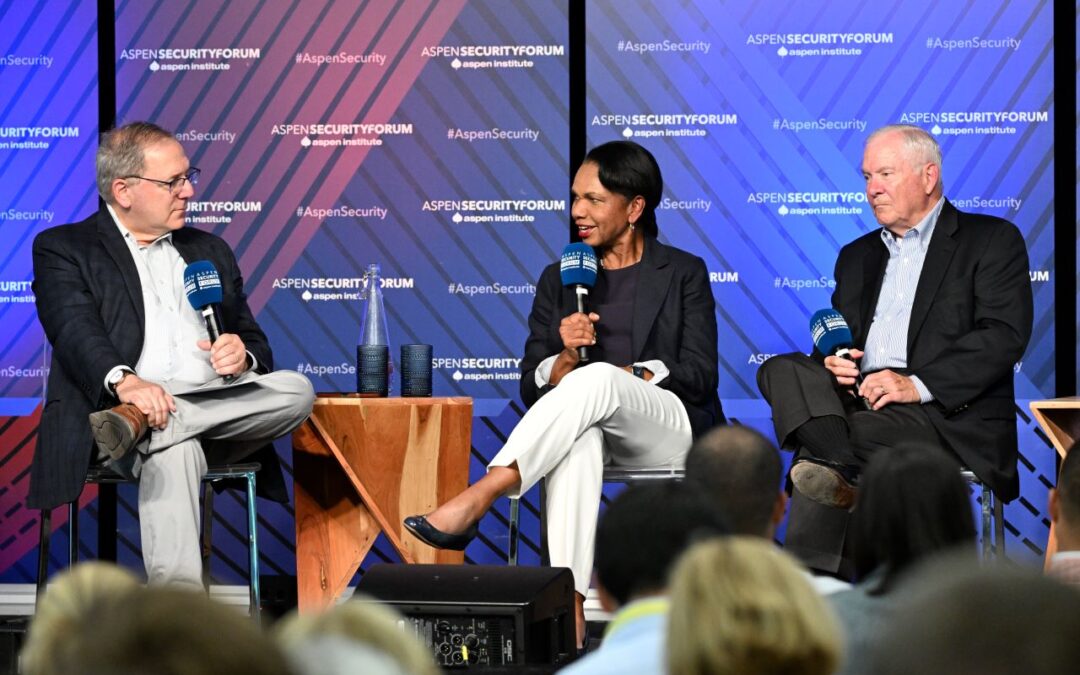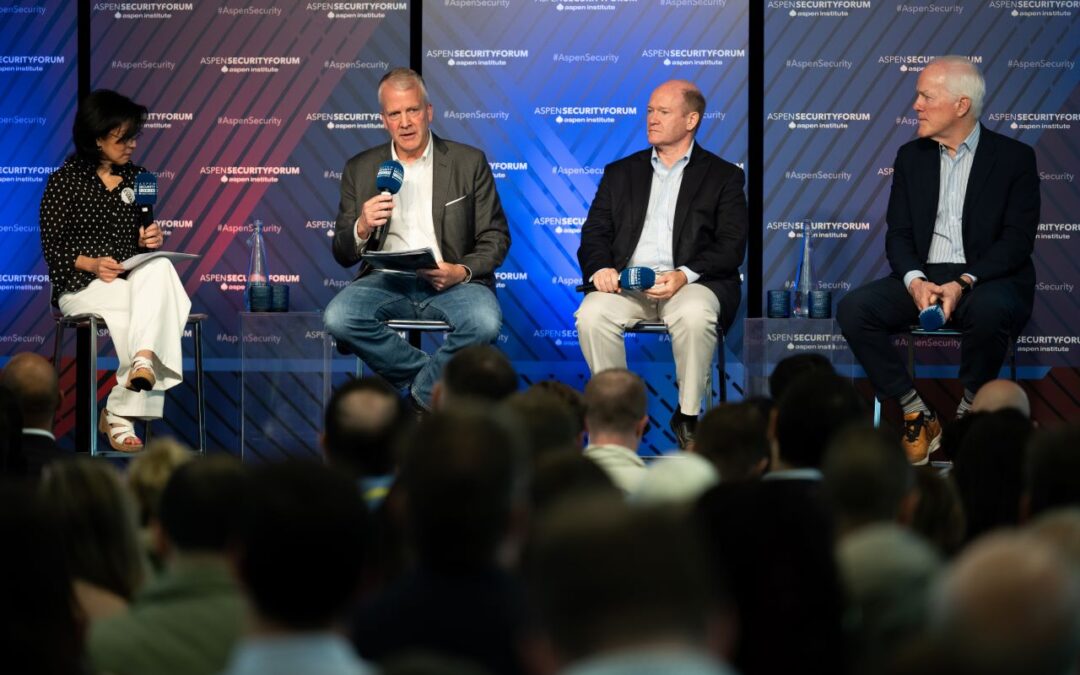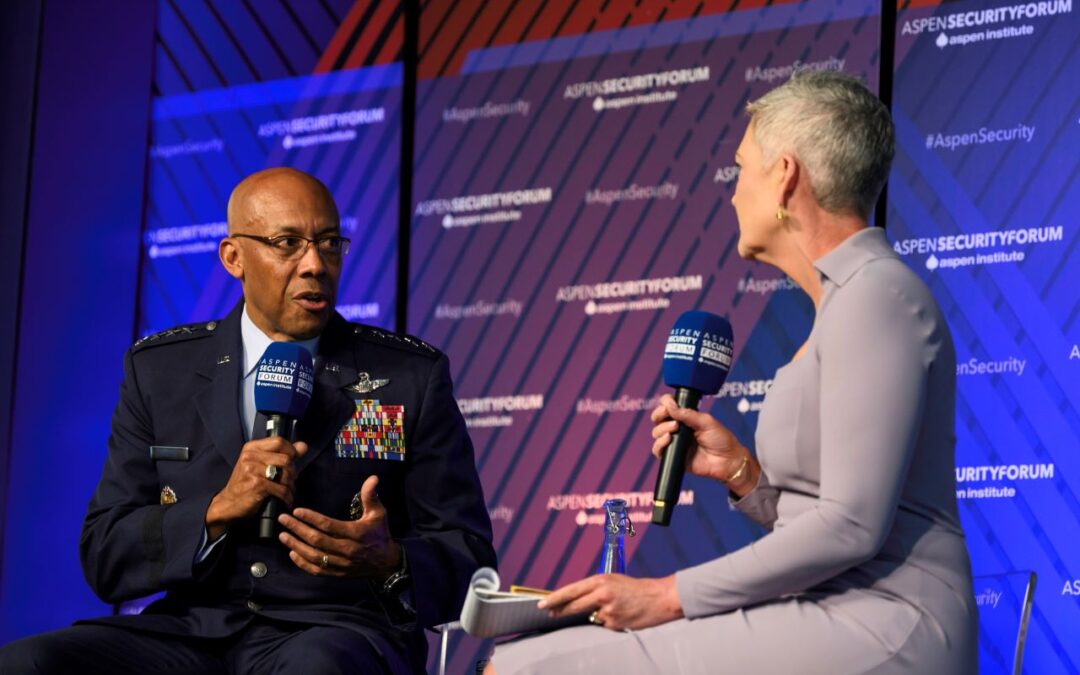Speakers
Katherine Tai, 19th U.S. Trade Representative
Moderator: David Westin, Wall Street Week Anchor, Bloomberg
Full Transcript
Read the full transcript below or download it to your device.
Click to read the full transcript
Anya (Intro) 0:05
United States Trade Representative. And boy, what a complicated job at a complicated time fair trade. It seems that both the left and the right and politics in the United States are making it difficult to negotiate trade deals. She is doing her best. She has just been out at APEC doing a great job for the country with many, many meetings and to interview her. We have David Westin from Bloomberg, thank you so much.
David Westin 0:44
Thank you, Anya, for the introduction. And thank you very much, Madam Ambassador for doing this.
Katherine Tai 0:49
Thank you so much.
David Westin 0:50
Everybody wants to hear from you.
Katherine Tai 0:51
I’m looking forward to this.
David Westin 0:52
So am I. So in thinking about this and think about your job, it struck me you have a multi layer job. You cover the globe, literally. But you also cover a lot of different aspects. I mean, some of us might think about trade is economics, which it is, but it also covers geopolitics, which is what this organization is really devoted to. It covers climate that covers the role. of workers a lot of different things. So let me ask you, one specific question that touches on the globe, and a lot of aspects and that is data in the WTO. You change the policy this fall, I think 30 years plus policy favoring when it comes to data flow across borders as well as location, you changed the policies that you were saying, Why did you do that?
Katherine Tai 1:37
Okay, let me take two steps back and just engage with the way you set up the conversation because I think it’s so important to reinforce this. When you say that you’re the United States Trade Representative and you’re abroad. I think people will say, Oh, well, you know, we have a commerce minister or foreign minister or trade minister or something like that. When you say you’re the US Trade Representative here at home, and I do as much I try to do as much domestic travel as I do foreign travel, you often just get blank looks like what is the US Trade Representative? And I think that that’s such an important part of the conversation, because to your point, we sit at the intersection of some very, very powerful forces. One of them is that we’re absolutely a part of a foreign policy team. You’re right. You have to do trade with others, other countries, other economies. So we’re part of the foreign policy tool. Set. But at the same time, trade absolutely is about economics, and what you the decisions that you make in your international economic policy impacts your domestic economy. So we are equally a part of the domestic economic policy team and we sit at that intersection and it’s an uncomfortable intersection, because these two forces are often pulling you in different directions, if not always opposite directions. So to your point, what, what we do internationally has to be connected to what we are doing what we are talking about what our objectives and our challenges are at home. And I’ll use that then to segue to your question about the WTO which is the public narrative is and I’ve this is my opportunity to explain and try not to get too wonky, although this is a wonky crowd. That what we did this fall at the WTO was not to reverse the position was not to change a position but to withdraw our attributions which is a you know WTO negotiation speak for withdraw our indicated support for three or four proposals in the ongoing WTO negotiations on an E commerce agreement. It’s not a full WTO negotiation, so it’s not the full 164 membership that’s participating. It’s a subset of about 90 A significant portion of the WTO. And what we did was to take a look at what our positions are, and to assess whether or not they still align with the domestic debate, domestic conversation, the domestic regulatory environment for these issues and because of its e commerce, it is really a negotiation over the digital economy, which at this point is so much of the economy, everything that we do in the economy now touches on technology and data. So as we were looking, we thought Yes, yes, yes, yes. For most of the proposals. We are still where we have been. And a couple of those proposals, ones that deal really specifically with data, data flows, data storage, data localization, we call it and also on source code. And these three areas, what I saw was that the debate that we are having here at home, the conversation around technology and technological advancement, and data and the regulation of the digital economy has shifted significantly since we put those proposals forward in 2019. And as a result, we needed to withdraw our attributions to create the space for us to come up with new positions and a new orientation for engaging with the other 90 countries that are negotiating this.
David Westin 5:34
Just so I think I can understand that. Is that a matter of domestic questions about possible regulation in this area, because there’s talk about that certainly in Congress, or is it a question of international dealings, particularly I’ll name of China, which has its own positions on some of those things you’re talking about data flow across and location of data, or is it a combination of the two?
Katherine Tai 5:55
I think that there are two aspects of it. So let me take the first one in terms of again, that connection between what we’re doing internationally in terms of trade and economic relations and negotiations and what is going on here at home. We’ve had the internet I actually remember it was my senior year of college that the summer between junior and senior years. I’m gonna date myself but I’m not sure that the World Wide Web was really rolled out for the world. And I remember coming back and going through a training where the question was, where do you put your mouse what you you put you you pass your mouse over text and if it’s highlighted, that means you can click on it. So that’s in my lifetime. That was my senior year of college right? So a lot has changed in a short amount of time. We here in the United States don’t have a very robust and this is an understatement. We don’t have a very robust regulatory system for the technology and economy environment. We’re struggling with that every day because in the last almost 30 years, I haven’t been out of college for quite 30 years yet, in the last almost 30 years, so much has changed. And the rules that we put in place and the fact that we don’t have rules for a lot of this is starting to come home to roost like like the famous chickens, right, we’re starting to realize that the implications of a regulatory system that started in the 90s and hasn’t evolved very far is creating disconnects with the implications of this technology advancement. So I’ll give you one very, very specific example that I think may resonate with a lot of people because it’s a large part of the conversation in so many ways. The unveiling of chat GPT four in the spring, I think was a wake up moment for all of us that wow, there’s a lot of innovation that’s going on in our economy. That is a great thing, but Holy Jesus, what is happening here and I would just say that even even five years ago, I had the opportunity to participate in a conference at Stanford where they did a whole AI presentation for us and at the time, the prompts that you are giving AI we’re coming out with hilariously funny outcomes when you ask AI that was being trained to write a joke. And the joke that came out to the back end was no almost never funny or it was funny because it was so unfunny. Right? So at the time, I think just five years ago 2019 2018 We’re thinking wow, this could have a lot of potential. There’s so much innovation, there’s so much stuff that’s brewing, but we don’t have to be worried about it yet because it’s still very rudimentary, short period of time, all of a sudden for all of you who have experimented with chat GPT for and you started putting prompts and literally blowing everybody’s minds, right which is the focus that we have now on AI. What is AI built on? It’s built on massive amounts of data. We’re coming back to the issue of data. How do you develop AI you have to have access not just to those massive amounts of data, you have to have access to incredibly powerful computing processes. You marry those two up and you’re going to push that innovation and push that development who has access to that kind of data and that kind of computing power. A very small number of extremely powerful and dominant companies that are almost all if not all American. And that’s why our posture on the rules that apply to data flows, data localization and source code is so important at the core of each of these proposals in these negotiations, is the question that we have to answer around the balance of authority between the private sector and the companies and the government and our regulatory authorities, who gets to decide or control how freely the data can flow and when it can be restricted, where it needs to be stored, and When access is required to disclose source code. And I think that those issues are very much consequential, not just for trade and economics, but for our entire society. And the cross cutting nature of these issues means that if we’re going to lead using trade rules at a time when there is no consensus, but massive amounts of debate and questioning, then I as USTR and committing massive malpractice and probably committing policy suicide by getting out ahead of all of the other conversations and decisions that we need to make as a country.
David Westin 10:47
You don’t want to be too far behind. You also can’t be too far ahead. You want to make sure that you get the balance right. You said almost all one place has a lawful lot of datas China and the developing computer really, very fast. Some people propose including foreign affairs that we should be having arms control negotiations with the US and China right now over generative AI. Does that make sense to you? Is that something being considered by the US government?
Katherine Tai 11:12
So I say that I’m on the foreign policy team, which I am on the national security issues or just say that, you know, if you think of it as a band, and Secretary Austin Secretary Blinken are like the lead singer and the lead basis, right. USTR? I’m kind of a backup singer or maybe a backup dancer. We are absolutely a part of the team. But I’m not driving that. And I don’t think I should be driving that national security piece as USTR. This is very much true today. And I think that past USTR has haven’t had to say it because our domestic situation was different and the global geopolitical situation was different, but I spend so much of my time thinking about democracy, democracy, we are a political democracy, but I as USTR spend a lot of my time thinking about how we can democratize economic opportunity here at home in America, and how we can do that with our partners so that they can do the same thing at home. And I think that that’s a really important part in terms of USTR and treating data as a national security controlled substance. I understand why that has relevance. But I think that we also have to understand the criticality of data to just our regular economic vibrancy,
David Westin 12:39
moving beyond data. You’ve taken us, I think, to a version of the Indo Pacific economic framework, something that President Biden went to Asia and really touted something that if you’re not the lead singer, you’re pretty close to lead singer on, give us a sense of where that stands right now. I think there were some expectations at APEC that we make some real progress. Some people were disappointed it didn’t feel like we did. Is that an accurate perception? And if so, why didn’t we make the progress?
Katherine Tai 13:03
So is it an accurate like, some people did express disappointment, but let me let me say what we did. The Indo Pacific economic framework is the Biden administration’s economic engagement framework and program for our partnership with our friends in the Indo Pacific. It has four pillars, and we’re very much applying lessons that we’ve learned from the past seven or eight years. So first, trade is a pillar, but it is not the only pillar. In addition to trade. We also had a pillar on a half a pillar on supply chains, one on decarb and infrastructure, climate financing, that kind of thing. And the last one on a specifically it’s tax and anti corruption, but I I like to think of it as good governance. When you take them all together, we feel that this is a more comprehensive economic engagement than just just a trade negotiation. Right. It’s also designed to be responsive to the challenges that all of us all 14 countries in the Indo Pacific framework are grappling with today. And those are economically with respect to our resilience with respect to our sustainability, and with respect to the inclusivity of the economic outcomes that we’re having at home and together. So each one of those pieces now on trade, let me drill down a little bit more there. Within the trade pillar, we’ve made very, very clear this is not a traditional Free Trade Agreement. This is not the TPP there are things that we did in the TPP that we’re not doing in the trade pillar, for example, tariff negotiations. We’re not doing them largely because right now, in terms of aggressive tariff liberalization, it is my view that we can’t we don’t have a program for doing a tariff program right now that will serve the purpose of resilience and more resilient supply chain so we’re not doing that but everything that we have scoped into pillar one, the trade pillar has had to answer yes to one or more of the following questions. Does this topic and issue area does this suite of rules promote more resilience, more sustainability? Or more inclusivity? And so we have been working very hard there about 10 different issue areas within the trade pillar. We’ve made significant progress to achieving consensus in about five and a half of them regardless of what we were planning to do or celebrate at APEC in November of this year. We had a very full 2024 negotiation agenda. We will continue with that we are committed to continuing with it and we have partners who have told us that they are excited and committed to continue negotiating with us through next year.
David Westin 15:58
Matter of Esther, you said we live in a democracy and part of democracies is politics. That’s the way we decide things in this country. We happen to have an election year coming up next year. Is it realistic to expect real progress in the Indo Pacific economic framework? In an election year because there are real domestic political consequences?
Katherine Tai 16:21
I’d say this, that the lessons that we’ve learned from the past, let’s say seven years on trade, mean that we can’t ever ignore the domestic political consequences of what we’re doing in trade. So in terms of looking at next year, it will be a particularly political year. But the issue of trade is inherently political. To your point when you are a part of the domestic economic policy team, how what you do impacts ordinary Americans at their kitchen table is always relevant. And so I think, from my perspective, next year for us, we will be sensitive to the scale, but not the nature of the year. And I think that for everything that we are doing, we stand 100% behind the responsibility that we have brought to how we’ve scoped and designed the negotiations.
David Westin 17:26
Let’s talk about how you invest your capital, but that way you’re responsible for trade agreements. And it strikes me that at least three categories of that new trade agreements, expanding current trade agreements or enforcing existing trade agreements. How do you allocate your time and resources among those three?
Katherine Tai 17:42
So well, this is how you do it. You spent 100% of your time negotiating, you spent 100% of your time enforcing you spent 100% of your time expanding
David Westin 17:54
walked right into that one.
Katherine Tai 17:55
Yeah, right. Okay. But I’ll take it as a as a segue to talking about our enforcement agenda. we do a lot of things, right. We were responsible for trade policy and have to think about that very broadly. In terms of trade enforcement, in order for our trade agreements and our trade arrangements to have integrity, we have to hold our partners accountable. For the promises that they have made to us and to our stakeholders and to their stakeholders to so we take the enforcement agenda extremely seriously. It is very high priority. A couple aspects of this I want to highlight one is with respect to the US MCA which is the renewed NAFTA. Now that renegotiation caught a lot of headlines while it was being renegotiated and it’s really a very, very interesting articulation of the basis for a modern new US trade policy. One of the most important aspects of the US MCA in terms of what it does that the NAFTA didn’t do, it has much stronger labor and environmental standards. It has stronger enforcement mechanisms, and it has, in particular, a labor specific enforcement mechanism that we call the rapid response mechanism for short. This is a mechanism that allows the United States and Mexico to work together to reach and pierce the veil of state to state interaction to focus on specific facilities within Mexico that are not respecting Mexico’s laws on labor justice, or the US MCA is rules and we have activated this. This mechanism I think the current count is 16 times 14 times at the behest of petitioners twice on our own initiative. And in every one of those cases that we have seen through to the end, we have won rights. We have won real benefits for workers in Mexico. Why this matters, democracy and the democratization of economic opportunity when Mexican workers have the ability as they should, under their own law, to advocate for themselves for better working conditions and higher wages. We are evening the playing field for American workers and I think it is not an accident that right now, about 90% of the cases that we have brought have been in the auto sector. And I’ll give you one specific example of early on in the first year was the first one of the first three cases that we brought was related to a GM facility in Ceylon Mexico as a result of our work on that, in partnership with the Mexican government. The workers at that facility were able to win a new vote for a union. They voted in a truly independent union to represent them. They voted on a collective bargaining agreement that that union negotiated for them that they saw before they voted to approve it, and they want better benefits. They won the first wage increase that they had had in years was a 10% wage increase and in the second year, that went up another 10%. These are real wins but the most significant part of this which I want more people to know about is what we are doing in the US MCA is relevant to everybody who is interested in trade because we have flipped the narrative. The strong criticism of US trade policy on its head for the first time ever, we are workers a mechanism for their own advocacy and empowerment through a trade agreement. Without this trade agreement. They wouldn’t have this mechanism. And they think that this is one of the cornerstones of what we call the the worker centered trade policy, which is to drive a trade policy that more Americans feel like is going to champion their interests. On the other hand, we’re also doing a lot for our farmers, as we always have. And within the us mca context without leaving that agreement. I’ll say that we’ve taken very seriously our corn producers concerns around the Mexican decree that will impact our trading relationship. And we initiated a dispute settlement case in the middle of this year and we’re litigating it out right now,
David Westin 22:29
on the subject of expanding existing agreements. We had I believe it’s your counterpart in Taiwan this week. say we’d like to have a free trade agreement. Let’s expand out what we have right now. Obviously, that would raise geopolitical issues, foreign policy issues. Are you open to that?
Katherine Tai 22:45
So the negotiation we’re having with Taiwan right now, and I’ll just highlight here. Every trade negotiation we’re doing right now has an element of innovation that’s baked in. And this is because we’re trying to be responsive to the data and the feedback that we are receiving from the world economy. There are so many changes that are going on simultaneously that I have not met even our smartest economists, even my colleague Janet Yellen, who is a legend in macroeconomics, no one can explain exactly what’s happening or predict exactly what’s going to happen next. And so from a trade policy perspective, what we have been very disciplined in trying to do is to say, let us bring a trade program to each one of our partners that’s tailored to that partner that’s tailored to their interests and our interest in the partnership that’s also tailored to the challenges and the dynamics that we are navigating together in the global economy. With Taiwan what that’s meant is that we have been negotiating agreements. And the first agreement that’s that we have with Taiwan is one that covers I think, five issue areas. Its trade facilitation its small, medium enterprises, good regulatory practices, and have to look at my notes for the other two, but we’ve got a core group of five disciplines. We signed that agreement, Congress in a fit of enthusiasm, even though they weren’t legally required to took a vote on it. To show their support for what we are doing. And on the basis of that support, we are negotiating another set of disciplines. Right as we speak, we’ve been making excellent progress, and we will continue to look at building out those agreements to to have an arrangement with the Taiwan economy that is fit for the times and the times are very challenging. And so this is one of our accomplishments that we are particularly proud of and committed to
David Westin 24:50
so you don’t rule out a free trade agreement, but it’s not now
Katherine Tai 24:53
look so let me let me back up to what what what do you mean by a free trade agreement? Right. Do you mean the traditional kind of us approach to a very, very comprehensive maximally liberalizing aggressively liberalizing agreement? We’re not doing that with anybody right now. It’s actually insensitive to the dynamics in the global economy and the US economy right now to push on with that program, which may have been fit for the 80s and the 90s. Maybe it was starting to show its age in the 2000s in 2010. It’s 2023. We need new policies. There’s innovation going on all around us when we were negotiating those agreements. I don’t know AI wasn’t even a thing that we talked about, right? So in all these different ways, but certainly, we hadn’t experienced the pandemic supply chain discombobulation and disconnect, the fragilities, the geopolitical tensions where we’ve always had them but they were different and at a different scale with different partners. So in all ways, as much as we embrace innovation instinctively as Americans, and certainly in our economy. We need to be embracing innovation in our trade policy, and that’s what we’re doing. And that’s why when you say FTA sure if by FTA. You mean are we innovating trade agreements and are we doing trade? Aggressively, but in new ways? Yes. When you say FTA if you mean, the old style trade agreements that we used to do then no.
David Westin 26:19
We have to talk about climate. It’s been a priority of President Biden from the beginning of the Biden administration. You said that trade does have a role in that and climate we’ve just been experiencing cop 28. What specifically can you do and trade the structure that will even be more pointed than that? Why don’t we have a carbon adjustment tax? That’s something that we’ve heard favorable things even from President Biden about. Democrats had a proposal didn’t go forward. Why don’t we just do that?
Katherine Tai 26:43
Okay so first, trade has to be part of the solution. Why aren’t we there yet? And I would say you’re talking to the wrong person. That question is should the US Congress tax policy who writes the tax policy? It’s not that we have no rule don’t get me wrong. Not but we each have our respective roles as prescribed by our founding document, which is the US Constitution with respect to tax policy. That is absolutely the jurisdiction of the United States Congress. We have to we have to have that congressional legislative revenue, Outlook and consensus or at least a basis before I can do anything appreciably meaningful in trade. That is true for climate. It is also true for digital,
David Westin 27:35
Congress gets to decide ultimately, is the Biden administration, pressing actively for a carbon adjustment tax.
Katherine Tai 27:40
Are we pressing aggressively for carbon adjustment tax?
David Westin 27:42
We’re known to happen to the White House proposes things to Congress to get them doing that
Katherine Tai 27:47
you should if John Podesta is still in the building, you should ask him to come back. ask him that question. Let me go back to your original question, which is, what are we doing with respect to trade and climate? The most important thing that we have been doing another of our innovative trade initiatives has been the negotiation of a global steel and aluminum arrangement with Europe. So we have had section 232 global tariffs on our steel and aluminum imports. The Biden administration’s perspective is with respect to global overcapacity, and global market distortions in steel and aluminum, that is a fact that we have to contend with. We have to be able to be a steel producer in the global economy. Including for national security reasons, but also for basic economic reasons. But we shouldn’t be taking that on alone. The distortions that are happening in the global marketplace are happening to our partners too. So we joined forces with the Europeans to say, let’s figure out how we can liberalize and normalize trade between us on steel and aluminum, but work together to defend our economies against unfair trade and unfair production and create incentives for cleaner trade and cleaner production. It also was helpful that the Europeans have put forward and are rolling out a carbon border adjustment mechanism that covers five or six sectors, very carbon intensive industrial sectors that include steel and aluminum. That is what we’ve been working towards. We gave ourselves two years we realized this fall that we’re going to need more time. And we are committed in the Biden administration on behalf of the United States to staying at the table and working on this issue. With Europe because it is so important, and it is foundationally important to creating a template for what we might do more broadly.
David Westin 29:34
We have time for one more question. I want to be on Africa. It’s something that’s important overall, and I know it’s important to you. Where are we right now with Africa and trade?
Katherine Tai 29:43
So I think that next week will be the one year anniversary of the President Biden’s African leaders summit, which we hosted last year in December. At the conclusion of that summit, President Biden gave an instruction to all of us in his administration, which is build partnerships with Africa, with the continent with the countries with the regions, and each one of us was encouraged to go to Africa early often. I’ve been to the continent twice this year. One trip in July was to Kenya we are negotiating another one of our innovative trade arrangements with Kenya. The other one was last month to Johannesburg, when South Africa hosted the AGOA forum. The AGOA forum is the trade program that we have with Sub Saharan Africa, these engagements and these exercises that I’ve been involved in our to pursue an enhanced, robust new approach to a US Africa economic partnership that helps us harness and develop the potential of Africa to be the economic engine that drives growth in this next period of globalization. But in order to do that, we’re going to need to figure out how to do it differently. We’re going to need development models that are more effective and more successful. Both sides of the equation and I’m very, very excited by what we’re doing.
David Westin 31:17
Better investor, thank you so much for your time. Really great to have you here. That’s Katherine Tai, US Trade Representative.


